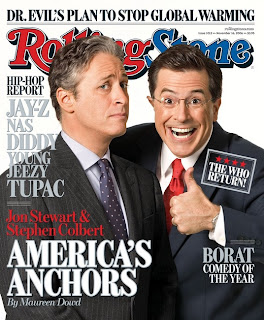I've always been a fan of both Jon Stewart and Stephen Colbert. Not a religious fan, mind you; I didn't tune in daily to see both of their shows and guffaw at all of the ridiculousness at which they worked so ardently to poke fun, but my ears would certainly perk up at the sound of either of their names. However as the rally got closer and gained national attention, I started paying a lot more attention to Jon Stewart in particular. Specifically, I started looking at his more serious moments; the moments in which he nearly abandoned comedy altogether, dropped the safety veil of sarcasm and distance, and took things head on with a stern demeanor and relentless ardor. His message has been consistently that the media has been taken over as a tool by politicians to convey their talking points unhindered and unchecked, and in those moments he himself sought to be the antithesis. [I speak of course of his most famous interview with Jim Cramer from CNBC in which he blamed CNBC (using Jim Cramer as their representative since he decided to come on the show) in part for withholding knowledge of the economic meltdown before it actually happened, and his appearance on Crossfire and his ugly back and forth with Tucker Carlson in which he begged them to "stop hurting America" with their "partisan hackery."]
So as the event came closer, I could sense that there was going to be an element of seriousness to it. I was not disappointed. I was slightly disappointed by the role of Stephen Colbert however. As a satirist, his humor is mostly achieved through his derision of the right wing elite by impersonating them to ridiculous extremes and rarely ever breaking character. This is, I find, a beautiful thing he has going, where he can make his point entirely without ever breaking character. Even his appearance in Congress, he held true to his character through the majority of it, right until the end where he had a moment of sincerity as California congresswoman asked him why he took on the issue of immigration reform. However, as Stewart had dedicated himself as the voice of reason, Colbert's role became that of the comic relief obstructionist in holding to his character, which by the way lost its partisan affiliation and became more of a fear-monger, presumably a media figure. The lengths he had to go to in order to be Stewart's antithesis became less funny and amiable, and more ridiculous and almost irritating.
As a purely comedic event, the rally was only worth a few chuckles at most, and that I believe was a wasted opportunity on their part, as a lot of their viewership was hoping for some serious laughs. If they had replaced the laughs with more serious material, it would not bother me as much, but that was not the case, it was more simply.... not funny. However the tour de force of the whole event came at the end when Stephen Colbert "died" and was dragged offstage along with his giant-fear-puppet-thing, leaving Stewart up alone with a honed-in audience, waiting for something, anything. What he delivered was a sincere and intimate twelve minute speech. Its oratory narrative did not come off as a call for action, nor did it come off as defeatist, but a man, a comedian, telling two hundred thousand people strong what he believed the politicians and the media failed to see in the American people: a reasonable, compromising and realistic melange of individuals less concerned with political narrative than being on time for their next appointment. He used a rather poignant analogy of cars lining up to take turns entering a one lane tunnel passing under a river. The cars have no concern for any ideological differences they may have with the neighboring cars, they take their turns just the same and cooperate to get through the tunnel. He finished by thanking his audience for being the Americans he hoped they were.
It is not uncommon for comedians to have a message, and it is not uncommon for comedians to disguise this message and deliver it under the guise of laughter: George Carlin bashed religion pretty heavily, he just had to make sure it was funny. Lewis Black was heavily political, ranting and raving through his humor. However comedians are very careful to keep track of their role and not get swept up in the passion they may feel towards their message. They are first and foremost comedians, purveyors of laughter and light-heartedness, and they like it that way; it pays their bills. Jon Stewart is beginning to emerge as a figure of trust to many people. He's beginning to be looked to now less for laughter and more for a candid look at the system, and I find this utterly fascinating. His ambitions are not political, he has much more interest in truth and information than resorting to one particular political party, and he seems less and less reliant on being a comedian first and foremost. I have no idea what his ambitions are, and I have no idea where he would be the most benefit to the people who now see him emerging into a new role, but I sense he is changing, and I believe this rally is just the beginning.

No comments:
Post a Comment